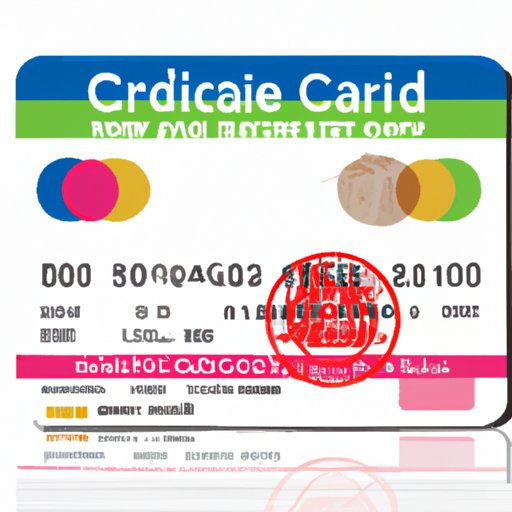Introduction
Having access to credit is an important part of running a successful business. Whether you’re just starting out or have been in business for years, having access to credit can help you manage cash flow, make large purchases, and invest in your business’s future. Establishing credit for your business can be intimidating, but with the right strategies and knowledge, it doesn’t have to be.
In this article, we’ll cover everything you need to know about starting credit for your business. Specifically, we’ll discuss how to research different business credit card options, establish your business’s credit history, leverage your personal credit score to secure business credit, utilize vendor credit lines to build credit, and monitor and maintain your business credit profile.
Research Different Business Credit Card Options
The first step to establishing credit for your business is to research different business credit card options. There are many advantages to having a business credit card, such as rewards and incentives, additional spending power, and improved cash flow management. It’s important to compare different cards to find one that fits your business’s needs and budget.
When comparing business credit cards, consider factors such as annual fees, interest rates, rewards programs, spending limits, and any other features that might be useful for your business. It’s also important to read the fine print and make sure you understand all the terms and conditions before committing to a particular card.
Once you’ve narrowed down your options, it’s time to apply for the card. Be sure to have all the necessary documents ready, such as financial statements, tax returns, and bank statements. You may also need to provide personal information such as your Social Security number and date of birth.
Establish Your Business’s Credit History
Once you’ve secured a business credit card, it’s important to use it responsibly. Make sure you pay your bill on time and in full each month, and don’t exceed your credit limit. This will help you build up a positive credit history for your business.
It’s also important to keep track of your spending. Create a budget and stick to it, and make sure you’re only using your business credit card for business-related expenses. This will help you avoid overspending and ensure you’re getting the most out of your credit card.
Finally, make sure you’re taking advantage of any rewards or incentives offered by your credit card company. These can help you save money on business expenses or earn cash back, which can be used to further invest in your business.

Leverage Your Personal Credit Score to Secure Business Credit
If you’re having trouble securing business credit, you may want to consider leveraging your personal credit score. This can be a great way to get access to the credit you need without having to go through the process of establishing a separate business credit history.
When using your personal credit score to secure business credit, it’s important to be mindful of how much you’re borrowing and what you’re using the money for. Make sure you’re only using the credit for legitimate business expenses and that you’re able to pay it back in a timely manner.
It’s also important to keep track of your personal credit score. Make sure you’re regularly checking your credit report and taking steps to improve your score if necessary. This will ensure that you’re able to continue to access the credit you need to grow your business.

Utilize Vendor Credit Lines to Build Credit
Another way to build credit for your business is to negotiate vendor credit lines. This involves negotiating with suppliers to receive goods and services on credit, rather than paying upfront. This can be a great way to build up your business’s credit history and gain access to the products and services you need to run your business.
When negotiating vendor credit lines, it’s important to be upfront about your creditworthiness. Make sure you’re honest about your current financial situation and provide any documentation that may be required. Also, be sure to research the supplier’s credit policies and make sure you understand all the terms and conditions before entering into any agreement.
Finally, make sure you’re tracking all your vendor credit lines and making payments on time. This will help you build a positive credit history and ensure you’re able to continue to access the credit you need for your business.

Monitor and Maintain Your Business Credit Profile
Once you’ve established credit for your business, it’s important to monitor and maintain your business credit profile. Make sure you’re regularly checking your credit report and taking steps to improve your score if necessary. Also, make sure you’re keeping track of all your accounts and making payments on time.
It’s also important to take proactive steps to protect your business’s credit profile. Make sure you’re aware of any changes to your credit score and taking steps to address any issues that arise. Additionally, be sure to review your credit report frequently to make sure there are no errors or signs of fraud.
Conclusion
Establishing credit for your business can be a daunting task, but with the right information and strategy, it doesn’t have to be. In this article, we discussed how to start credit for your business, including researching credit card options, establishing a business credit history, leveraging your personal credit score, utilizing vendor credit lines, and monitoring and maintaining your business credit profile.
Now that you have a better understanding of how to start credit for your business, it’s time to take action. Use the strategies outlined in this article to help you secure the credit you need to grow your business and achieve success.
(Note: Is this article not meeting your expectations? Do you have knowledge or insights to share? Unlock new opportunities and expand your reach by joining our authors team. Click Registration to join us and share your expertise with our readers.)
